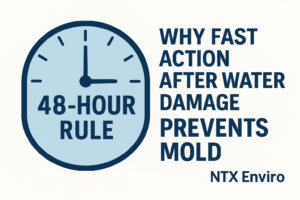Buying a home is one of the biggest financial decisions you’ll ever make. Between inspections, negotiations, and stacks of paperwork, it’s easy to overlook one silent but costly threat: mold.
Mold doesn’t just impact property value – it can create health risks, structural damage, and legal complications if not addressed before closing. In this post, NTX Enviro explains what every homebuyer should know about mold before signing the dotted line and how a professional mold inspection can protect your investment.
Why Mold Is a Concern in Real Estate
Mold issues are more than cosmetic. They can influence both the livability and marketability of a property.
- Hidden Damage: Mold often grows behind walls, under floors, or in HVAC systems where it isn’t visible during a standard home inspection.
- Health Risks: Mold exposure can trigger allergies, asthma, and other respiratory issues.
- Financial Impact: Mold remediation can cost thousands of dollars, and undisclosed mold may reduce resale value.
- Legal Documentation: In Texas, mold remediation ties directly into real estate transactions through the Certificate of Mold Damage Remediation (CMDR).
Standard Home Inspections vs. Mold Assessments
Many buyers assume a standard home inspection covers mold, but that’s not always true.
Home Inspection
- Focuses on overall condition: structure, roof, plumbing, HVAC, and electrical.
- May note visible mold but doesn’t include testing or sampling.
- Inspectors are not licensed mold consultants.
Mold Assessment
- Conducted by a licensed Mold Assessment Consultant (MAC) in Texas.
- Includes moisture mapping, sampling, and lab analysis.
- Provides documentation for lenders, insurers, or future buyers.
👉 Tip: Don’t rely solely on a home inspection when buying a property. Add a dedicated mold inspection to your due diligence process.
(NTX Enviro Mold Inspection Services)
Common Places Mold Hides in Homes
Mold growth often develops in hidden areas where buyers don’t think to look. A professional assessment includes testing in common problem spots:
- Attics (roof leaks, poor ventilation)
- Basements & crawl spaces (groundwater intrusion)
- Bathrooms (leaky plumbing, poor exhaust fans)
- Kitchens (dishwasher and sink leaks)
- HVAC systems & ductwork (condensation and poor drainage)
- Behind drywall or under flooring after water damage
Even new homes can harbor mold if building materials were exposed to rain during construction.
The Role of the Certificate of Mold Damage Remediation (CMDR)
Texas law requires that licensed mold contractors issue a CMDR after completing remediation. This document is important for buyers:
- Proof of Proper Remediation: Shows that mold cleanup followed state guidelines.
- Insurance Protection: Lenders and insurers may require a CMDR to process coverage.
- Resale Value: Buyers in future transactions will want assurance that past mold problems were professionally handled.
Without a CMDR, you risk disputes over whether the property had unresolved mold damage.
Questions Homebuyers Should Ask Before Closing
Before finalizing a purchase, ask these questions to avoid unpleasant surprises:
- Has the property ever had water damage or flooding?
- Was mold ever discovered or remediated?
- Is there a current or past CMDR on file?
- What steps have been taken to prevent mold (e.g., sump pumps, ventilation)?
- When was the last professional mold inspection conducted?
If the seller can’t answer these questions, or refuses to provide documentation, it’s a red flag.
What to Expect From a Professional Mold Inspection
At NTX Enviro, our mold inspections for homebuyers include:
- Visual Survey – Identifying visible signs of mold or water damage.
- Moisture Mapping – Using thermal imaging and moisture meters to detect hidden leaks.
- Air & Surface Sampling – Sending samples to accredited labs for precise results.
- Comprehensive Report – Detailing findings, risk areas, and recommendations.
- Clear Guidance – Explaining whether remediation is required and what steps should follow.
This process ensures buyers have the facts needed to negotiate repairs, request seller credits, or walk away if necessary.
The Cost of Skipping a Mold Inspection
Some buyers skip mold inspections to save time or money. Unfortunately, this shortcut often leads to bigger expenses later.
- Remediation Costs: Professional cleanup can range from a few hundred dollars to $10,000+ for widespread contamination.
- Health Costs: Allergies, asthma treatment, and lost productivity add hidden expenses.
- Resale Risks: If mold issues are discovered later, you may face legal disputes with future buyers.
👉 Paying for a mold inspection upfront is far cheaper than dealing with unaddressed mold after you move in.
Conclusion
Mold may not always be visible, but it can have a major impact on your health, home, and financial investment. Standard home inspections aren’t designed to uncover mold problems, which is why a dedicated mold assessment is critical for every homebuyer.
By requesting documentation, asking the right questions, and scheduling a professional inspection, you’ll protect yourself from costly surprises and ensure your new home is truly move-in ready.
Don’t close on a home without knowing the facts.
👉 Schedule a Professional Mold Inspection with NTX Enviro Today
Our licensed consultants provide unbiased inspections, thorough documentation, and peace of mind—so you can buy with confidence.


